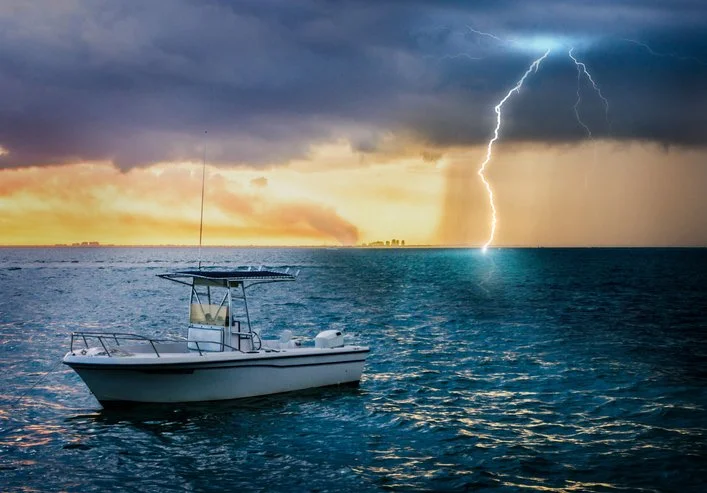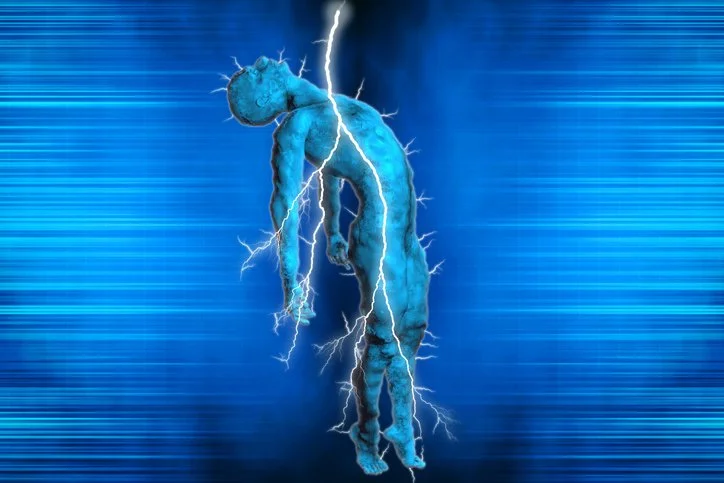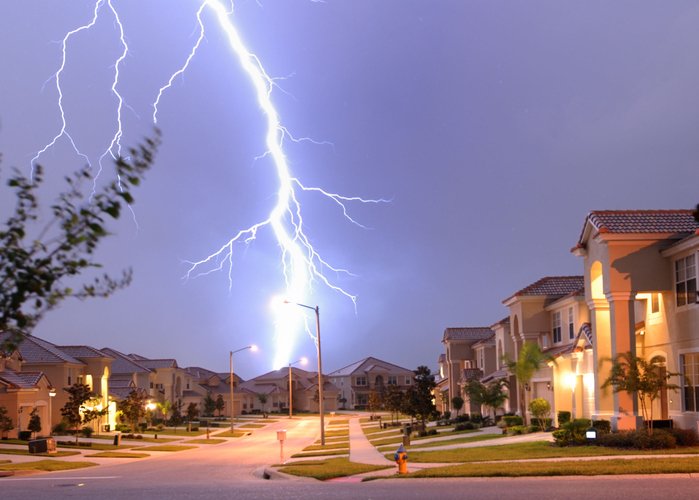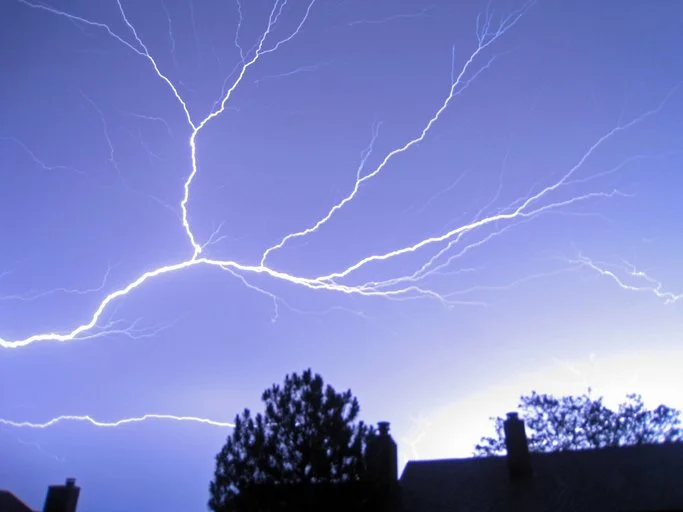What Lightning Does to the Body—and How to Stay Safe Outdoors
By: Joy Stephenson-Laws, Holistic Coach, J.D., Founder
Lightning is beautiful to watch — until it turns deadly. In July 2025, two heartbreaking stories reminded us how fast a thunderstorm can become a tragedy. Simon John Mariani, a 28-year-old golfer, was struck by lightning on a golf course in New Jersey and died a few days later. Around the same time, Audun Grønvold, a 49-year-old Olympic skier, was hit by lightning while at a cabin with his family and didn’t survive. These stories show that lightning is still a real threat.
How Often Does Lightning Kill People in the U.S.?
You might think lightning deaths don’t happen much anymore — but they do. Every year, lightning kills about 20 to 30 people in the United States. Hundreds more are hurt. While the numbers have gone down over the years thanks to safety education, lightning still kills more people than tornadoes or hurricanes.
Most people who die from lightning are outside when it happens. Florida has the most lightning deaths of any state, mostly because of its hot, stormy summers. Other states with high numbers include Texas, Colorado, North Carolina, and Arizona. On the other hand, states like Alaska, Hawaii, and Washington have very few deaths.
Most victims are men in their 30s or 40s. In fact, about 8 out of 10 lightning victims are male. Most deaths happen in summer, especially in July, and usually between noon and 6 p.m. — the time of day people are often outside having fun. Fishing, boating, sports, camping, and mowing the lawn are some of the most common activities when people are struck.
While your chances of being struck are very low — less than 1 in a million in any given year — being outside during a storm raises your risk a lot. As lightning safety expert John Jensenius puts it, most deaths happen because people are in the wrong place at the wrong time. But here’s the good news: you can stay safe with just a few smart steps.
What Happens When Lightning Strikes a Person?
Lightning is fast, powerful, and extremely hot — hotter than the surface of the sun. When it hits a person, it acts like a giant electric shock that explodes through the body.
Lightning can:
• Stop your heart or cause it to beat out of control.
• Shut down your brain, making it hard to breathe or stay awake.
• Burn your skin and damage muscles, nerves, or organs.
• Blow you off your feet or burst your eardrums with its shockwave.
Doctors say lightning injuries are some of the most serious they see. Even if someone survives, the damage can last for years.
What It Feels Like to Be Struck
Survivors say it feels like getting hit by a truck or punched by something invisible. You may lose control of your body, fall down, or feel intense heat. Some people can’t talk or move right away. Others don’t remember what happened at all. Lightning can leave strange burn marks on the skin — even patterns that look like tree branches.
Long-Term Effects
Surviving a lightning strike doesn’t always mean you’re okay. In fact, most people who survive are left with long-term problems, like:
Weakness or pain in the arms and legs.
Trouble with memory or thinking clearly.
Mood swings, anxiety, or depression.
Dizziness or trouble with balance.
Doctors say everyone who gets struck by lightning should go to the hospital, even if they feel fine at first. Problems like heart failure, kidney damage, or brain swelling can happen hours later.
How to Stay Safe During a Storm
Here’s the simple rule: If you hear thunder, get indoors. If thunder is close enough to hear, lightning is close enough to strike.
Best Places to Be:
Inside a building with plumbing and wiring
Inside a metal-roofed car with the windows up
Never Stay In:
Open fields or high places
Under a tree or near a pole
Tents, sheds, or porches
Golf carts, bikes, or boats
What to Avoid Indoors:
Taking a shower or bath
Washing dishes
Using wired phones or plugged-in electronics
Wait at least 30 minutes after the last thunder before going back outside.
If You’re Caught Outside
Sometimes you can’t get to shelter right away. If that happens:
Stay away from tall objects like trees and flagpoles.
Get off hills and out of open fields.
Stay out of water.
Don’t lie down — crouch low with your feet together.
Remember, it’s better to get a little wet than take a deadly chance with lightning.
What to Do If Someone Gets Hit:
Call 911 right away.
It’s safe to touch them. Lightning victims don’t carry a charge.
Check for breathing and a heartbeat.
Start CPR if needed and don’t stop until help arrives.
Fast action can save a life.
A Final Word: Don’t Wait to Get Safe
Lightning doesn’t give warnings. It can strike before the rain starts or after it ends. That’s why safety starts the moment you hear thunder or see dark clouds.
Don’t be one of those stories on the news. Protect yourself and the people you love. Stay aware, make a plan, and when thunder roars — go indoors.
REFERENCES
ABC News. (2025, July 16). Golfer, 28, dies after being struck by lightning in New Jersey. https://abcnews.go.com/US/golfer-28-dies-after-struck-lightning-playing-new/story?id=123797498
The Guardian. (2025, July 15). Norwegian Olympic medalist Audun Grønvold dies after lightning strike. https://www.theguardian.com/sport/2025/jul/15/audun-gronvold-dies-lightning
National Weather Service. (n.d.). Lightning safety. National Oceanic and Atmospheric Administration. https://www.weather.gov/safety/lightning
Centers for Disease Control and Prevention. (2022, June 15). Lightning strike injuries. https://www.cdc.gov/disasters/lightning/injuries.html
NOAA. (n.d.). Lightning safety toolkit. National Oceanic and Atmospheric Administration. https://www.weather.gov/media/lightning/toolkit/lightning-safety-toolkit.pdf
Fox News. (2025, July 15). Man dies after being struck by lightning on New Jersey golf course. https://www.foxnews.com/us/man-dies-struck-lightning-new-jersey-golf-course-report
University of Florida IFAS Extension. (2021). Lightning safety: Facts and myths. https://edis.ifas.ufl.edu/publication/AE172
Rutgers New Jersey Medical School. (n.d.). Dr. Lewis Nelson on lightning injury mechanisms. https://njms.rutgers.edu
Prevention Magazine. (2023). Struck by lightning? Here’s what happens to your body. https://www.prevention.com/health/a44029156/what-happens-when-you-get-struck-by-lightning/
Occupational Safety and Health Administration. (n.d.). Lightning safety when working outdoors. United States Department of Labor. https://www.osha.gov/lightning





